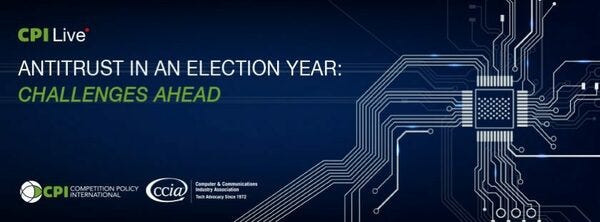Competition Corner by Alden Abbott - Halloween Season at the Antitrust Agencies: Expect More Tricks than Treats
Issue #10
Originally Posted October 31, 2022
Happy Halloween! Just like how those of us with kids (or grandkids) will run around our neighborhoods this evening, the FTC and the Justice Department’s Antitrust Division ostensibly will be trolling for treats. Unfortunately, it appears far more likely that the private sector will suffer tricks at the hands of the agencies, no matter what treats (in the form of solid efficiency justifications, for example) that private parties may offer.
In honor of Halloween, Mercatus has been busy providing its own version of treats to our loyal online audience, in the form of a “big picture” research paper on data privacy (authored by our very own Dr. Tracy Miller), plus the usual array of commentaries and op eds. Let’s take a quick look at our recent output – I hope you find these treats delectable.
The Role of Institutions and Policy in Balancing Privacy and Information Sharing in the Digital Economy | Mercatus Center
Online service providers collect personal data to earn revenue from targeted advertising and for other purposes. This has raised concerns about privacy and data security and resulted in several states enacting comprehensive data protection laws and others considering doing so. Stricter privacy legislation, however, could reduce the incentives of digital platform companies to provide the enormous variety of information and online services free of charge.
In “The Role of Institutions and Policy in Balancing Privacy and Information Sharing in the Digital Economy,” Tracy C. Miller states that targeted federal regulation could reduce uncertainty and compliance costs, which would better protect the privacy of consumers in online exchanges, and maintain competition and incentives for innovation in the market for online services.
FTC on the Gig Economy: The Glass is Almost Empty | Truth on the Market
The FTC’s gig work “policy statement” attacks gig sector independent contracting as a threat to workers, and implicitly endorses the use of traditional employment contracts instead. As I explain, in so doing it ignores the benefits of independent contracting to the gig sector. It could thus harm a key area of our economy if its suggestions were taken seriously.
Price-Parity Clauses: The Good, The Bad, and the…Anticompetitive? - Truth on the Market
Price-parity clauses have, until recently, been little discussed in the academic vertical-price-restraints literature. Their growing importance, however, cannot be ignored, and common misconceptions around their use and implementation need to be addressed. My research assistant Andrew Mercado, in a commentary for truth on the market, lays out consumer welfare enhancing uses of price-parity clauses, and proposes a novel method of analyzing these clauses in the modern e-commerce economy.
Upcoming Events
January 26, 2023 | Mercatus Center’s 2nd Annual Antitrust Forum: Policy in Transition
During the past year, antitrust policy has been in a state of tension. Enforcers on both sides of the Atlantic are moving toward a more expansive regime filled with rules, regulations, and interventions. Courts, however, are holding firm to an antitrust policy centered on consumer welfare enhancement that has, by and large, held sway over the last four decades. On January 26, 2023 the Mercatus Center will host its 2nd annual antitrust forum at George Mason University. Sign up today to reserve your spot at the antitrust event you won’t want to miss.
October 31, 2022 | Big Tech and M&A: Killer Acquisitions and Kill Zones? | Bipartisan Policy Center
Given the spooky environment surrounding Halloween, it is the perfect time to discuss “killer acquisitions” and “kill zones” in the tech sector. Join Charlotte Slaiman, Mark Meador, Dr. Thomas Wollmann, and me, for a discussion of these ominous sounding topics moderated by John Soroushian. Have big tech acquisitions fatally wounded competition, or are incentives to innovate powerful enough to protect competition from these “killer” threats?
November 2, 2022 | Challenges to Antitrust in a Changing Economy | Competition Policy International
Enforcers of competition laws are observing and taking action toward new practices in the shifting economy. Some even experienced pushback regarding their rulemaking authorities in taking a proactive stance in the frontier of antitrust enforcement and competition policy-making. After a brief discussion between Andrew Gavil and Leah Nylen, I will join Daniel Crane, Marina Lao, and moderator Terrell McSweeny for a discussion on the efficacy of rule making versus enforcement to effectively curtail anticompetitive behavior in the market.
www.competitionpolicyinternational.com • Share
Mercatus Center’s 2nd Annual Antitrust Forum: Policy in Transition | Mercatus Center
During the past year, antitrust policy has been in a state of tension. Enforcers on both sides of the Atlantic are moving toward a more expansive regime filled with rules, regulations, and interventions. Courts, however, are holding firm to an antitrust policy centered on consumer welfare enhancement that has, by and large, held sway over the last four decades. On January 26, 2023 the Mercatus Center will host its 2nd annual antitrust forum at George Mason University. Sign up today to reserve your spot at the antitrust event you won’t want to miss.
November 14-15, 2022 | Standards, Patents & Competition 2022: Standard Essential Patents | IP Watchdog
F. Scott Kieff, Deanna Okun, Theodore Essex, and I, among others, will engage in a high-level, interactive discussion on the relationship between standard essential patents, standard development organizations and antitrust law and regulation. We will also examine the current state of FRAND litigation, the role of patent pools, SEP litigation at the International Trade Commission, and specific current issues in Europe, litigating SEPs in South America, and the politics, legislation and regulation of essential patents in the United States.












